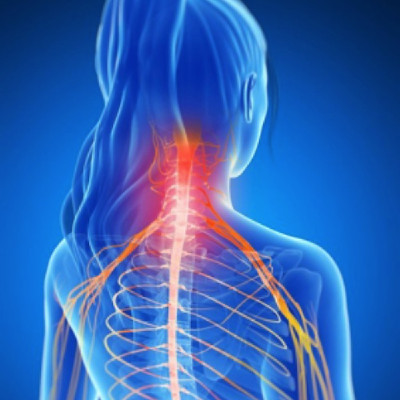Neck Pain
Causes and Treatment
Neck pain is one of the most common ailments among the British population, with 31% of people surveyed reporting they experience neck pain at least once a week while working (Chartered Society of Physiotherapy: Sickness Costs, 2009). The neck consists of seven vertebrae and between each of these you find the discs. Together they form the cervical spine. The spinal cord, which holds all of the nerves, run through the vertebrae from the brain all the way down to the coccyx. As the main highway for the nerves to pass through, neck injuries can range from a minor niggle to a debilitating condition which severely affects the life of the patient.
Injury to the neck can cause pain and/or stiffness in the neck and thoracic spine, as well as headaches and pain which radiates across both shoulders and down to the shoulder blades. If spinal nerves are involved, patients can often experience pain, tingling and numbness in one or both upper extremities.
Causes of Neck Pain
- Trauma - A sudden trauma to the neck such a road traffic accident, a sudden fall or a seemingly minor knock to the head can cause long-lasting neck issues which may grow more severe over time as imbalances grow.
- Postural Problems - Our increasingly sedentary lifestyles has seen an increase in neck problems from poor posture. Computer use can lead to rounded shoulders and forward head syndrome - both which cause the shortening or tightening of muscles in the neck with common culprits being the scalenei , levator scapulae and upper trapezius.
- Arthritic conditions - Neck pain may stem from underlying conditions such rheumatism and osteoarthritis which have an effect on bones and joints in the neck area. Arthritic conditions may cause increased pressure on the spinal cord and associated nerves.
- Sleeping position - An awkward sleeping position can put the neck at a compromised angle for hours on end, leading to compression of the spinal nerves.
- Stress and tension - The neck muscles are particularly prone to tightness which is increased by stress and tension from everyday life. Tightening of muscles around the neck can lead to imbalances between the left and right side and ‘nodules’ in the neck which press on nerves causing ache or pain to the associated area.
Treatment
Often neck pain can seem innocuous, but when left untreated can develop into a life-altering complaint. The body strives to be balanced and even the worst cases of neck pain can often be solved surprisingly quickly, just by allowing the body to re-balance the neck muscles. When a patient comes to me with neck pain I carry out a thorough assessment to diagnose the underlying cause of the pain. A tailor made treatment program is created to aid the recovery of the injury. This includes advice about the injury and it’s causes, specific exercises to target muscles which have become under-active or weakened, massage and mobilisation techniques to regain full mobility of the cervical spine and electrotherapy to repair tissue and stimulate muscles.
Patients can carry out stretching and mobilising exercises to ease pain and stiffness in the neck. I often advise to strengthen the muscles around the neck and shoulder girdle. In day to day life it’s important to ensure the neck isn’t held for prolonged periods in a comprised position which overworks neck muscles and causes fatigue. Small things like adjusting the height of a computer monitor or adjusting/changing your pillow can go a long way to easing neck pain. The use of hot or cold packs to relieve tension in the neck for a period of pain-relief can also be useful.
